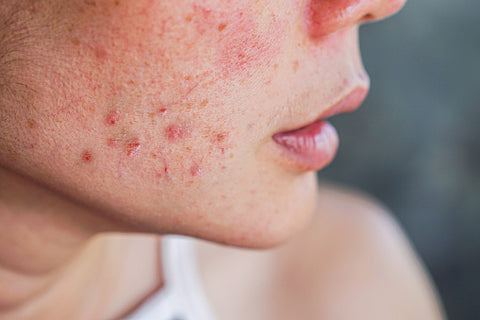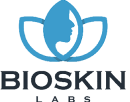We all wish to have spotless skin that glows all the time.
However, mainly, acne shatters our wish in no time, especially when we have an essential event approaching.
If you are too worried about the acne on your skin, do not! There is a reason why they are there, and the following article explains how you can get rid of them for clear, spotless skin.
Symptoms of Acne: What Changes You Need to Keep an Eye For?
The symptoms of stubborn acne vary according to the severity of your condition:
- Whiteheads (closed plugged pores)
- Blackheads (open clogged pores)
- Small red bumps that are tender (papules)
- Pimples (pustules) are papules that have pus at their tips.
- Under the skin, there are large, solid, painful lumps (nodules)
- Under the skin, painful, pus-filled nodes (cystic lesions)
Mostly, acne is found on the face, forehead, chest, upper back, and shoulders.

What Treatment Should We Use To Reduce Acne?
Unfortunately, acne scars are difficult to treat, and no single treatment works for everyone.
Depending on your scar type, skin type, and severity of the scarring, one or a combination of the following approaches may improve the appearance of your skin.
- Skin care at home: Using sunscreen can help to reduce the contrast between scarred and unscarred skin. Medicated creams containing azelaic acid or hydroxyl acids may also be beneficial.
- Fillers for soft tissues: Collagen, fat, or other substances injected beneath the skin can plump skin over indented scars. The goal is to hide imperfections through repetitive treatments for continued influence.
- Injection of steroids: Some types of raised scars can be improved by injecting steroids into them.
- Resurfacing with a laser: This method is becoming more popular and is frequently used on scars previously treated with dermabrasion. If you have darker skin or a history of keloids, you are more likely to experience side effects from this technique.
- Other energy-intensive procedures: Pulsed light sources and radiofrequency devices can help make scars less visible without damaging the skin’s outer layer. The effects are subtle, and you may need to repeat treatments.
- Dermabrasion: The procedure is usually for severe scarring. In this, the highest layer of the skin is removed by your doctor using a rapidly rotating brush or another device. Surface acne scars can be removed entirely, and deeper ones can be made less visible.
- Peeling agent: Your doctor will apply a chemical solution to the scar tissue. This way, the top layer of skin will be removed, reducing the visibility of deeper scars. To keep results, repeat mild and medium peels. You can only have one deep peel. Changes in skin colour are possible side effects, mainly when deep peels are used on dark skin.
- Needling of skin: A needle-studded device is rolled over the skin by your doctor to stimulate collagen formation in the skin tissue. The skin treatment is simple and safe yet effective for acne. It poses little risk of skin discolouration.
- Surgery: Your doctor will use a minor procedure called punch excision to remove individual acne scars and close wounds with stitches or a skin graft. Subcision is a technique in which your doctor inserts needles beneath the skin to loosen fibres beneath a spot.
- OnabotulinumtoxinA (Botox): The skin around acne scars can pucker. Injecting Botox relaxes the surrounding skin, which may improve the appearance of an acne scar. Because effects are only temporary, repeat treatments are required to maintain them.
All about Acne Scars:
Acne is a common, often aggravating condition that can result in scarring and dark spots. While acne scars will not disappear independently, there are several ways to lighten or reduce their appearance. However, remember that all the strategies take time to work, so concealer is your best bet if you need a quick fix.

Acne Scar Categories You Should Know About:
Acne scars vary from person to person and come in various shapes and sizes. They are classified as one of the following:
· Scars that have deteriorated (atrophied)
As the skin regenerates, collagen loses collagen, resulting in depressed acne scars. Examples include:
- Icepick scars are small, deep skin holes.
- Boxcar scars are larger oval or round depressed skin areas with distinct edges resembling chicken pox scars.
- Rolling atrophic scars are broad depressions in the skin that have a rolling or undulating appearance, similar to an “M” pattern.
· Scars that are raised (hypertrophic)
After healing from acne, the skin is likely to produce immense collagen. As a result, you see raised scars on your skin. They are most commonly found on the chest and back.
· Spots of darkness (post-inflammatory hyperpigmentation)
While dark spots are not scars, they are a clear reminder of acne. The inflammatory process of acne on the skin can cause hyperpigmentation or darker colouration after the acne is healed. Additionally, treatments for acne scars can cause hyperpigmentation, especially in people with darker skin. Those with lighter skin may experience post-inflammatory redness instead.
Can Acne Scars Be Removed?
First and foremost, many people who suffer from acne scarring want to know if scarring can be removed naturally. The truth is that it will ultimately depend on the type of scarring you have. Some atrophic acne scars, such as post-inflammatory hyperpigmentation, will fade over time as the skin heals. Nonetheless, depending upon your skin type and the severity of your acne, even atrophic scars can last for years.

Are You an Acne Scar Treatment Candidate?
Most people with acne scars are good candidates for acne scar treatment. Women and men over 21 with post-inflammatory hyperpigmentation, icepick scars, boxcar scars, rolling scars, or keloid scars are typically good candidates for one or more acne scar reduction and removal treatments.
Candidates for this treatment should have healthy skin and well-managed acne. Some acne scar treatments are ineffective if you have active acne. To treat your acne scars, you may need first to reduce or control your active acne.
 Log in
Log in
